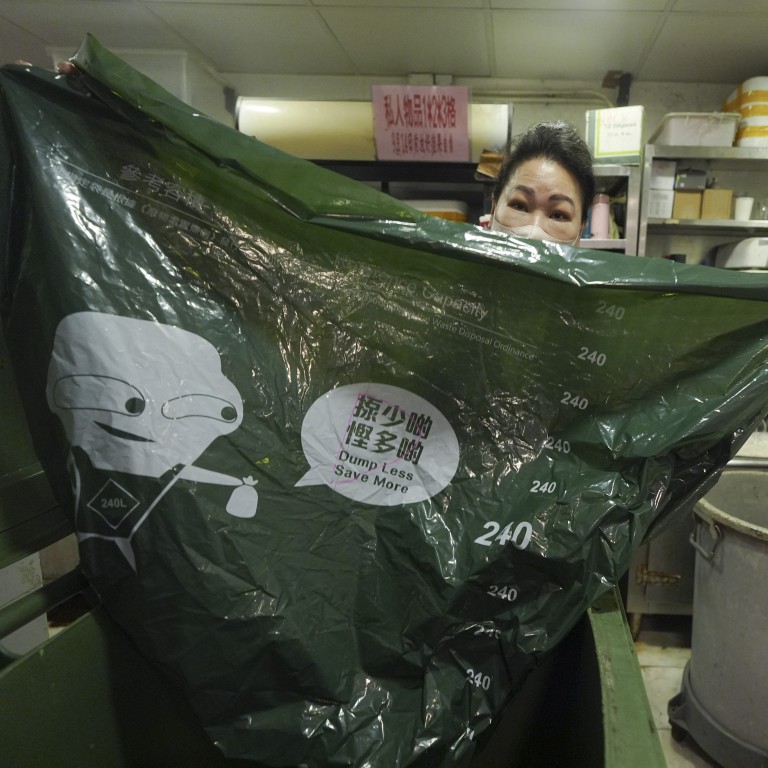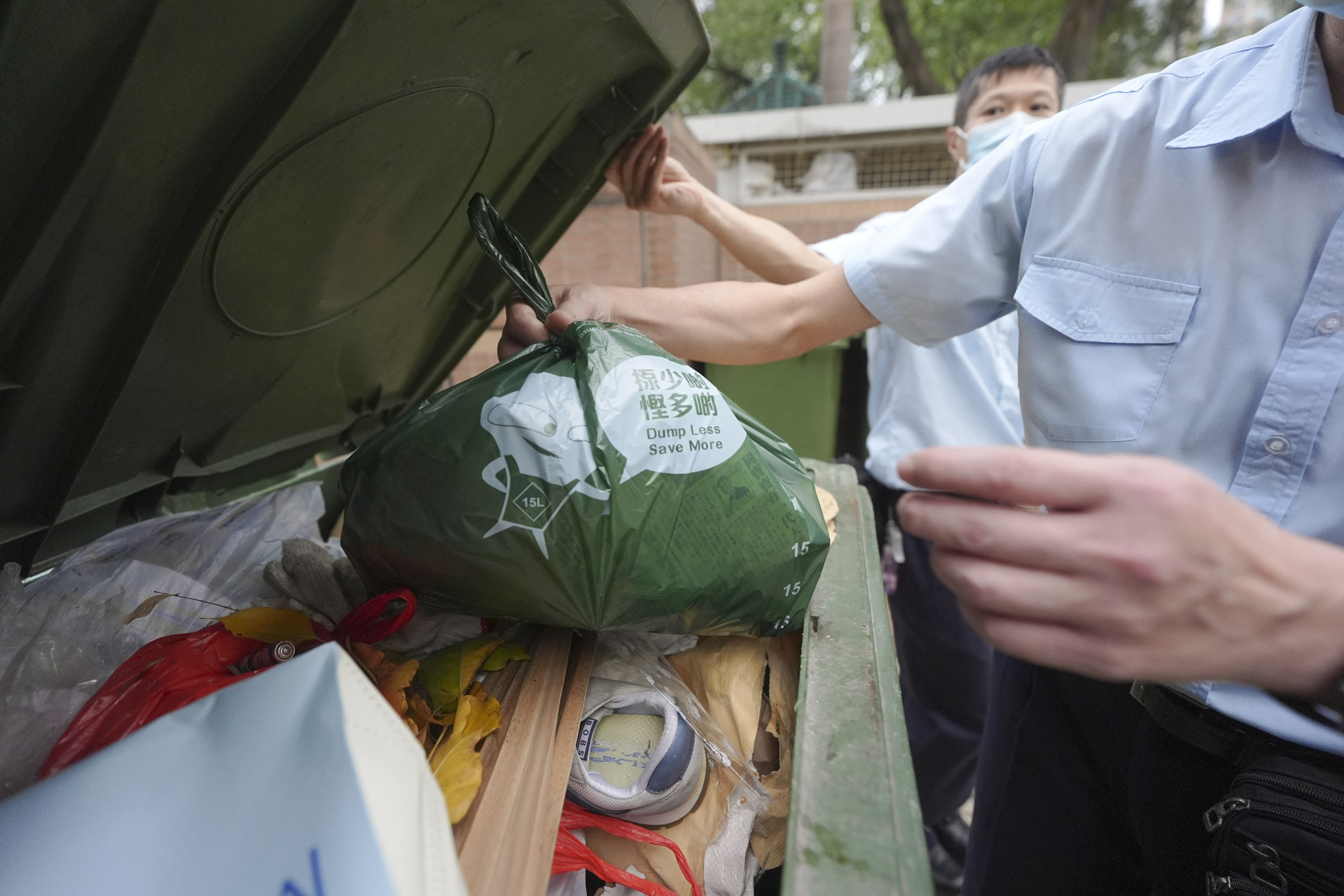
Hong Kong catering sector not ready for twice-delayed waste-charging scheme: top government adviser
- Executive Council member warns industry’s personnel shortage is making it difficult to ensure waste is properly recycled, days after pay-as-you-throw trial run launches
- Lawmaker calls for focus on developing recycling sector by opening up more collection points, says trial scheme should be expanded
“We cannot see that all the 20,000-odd licensed food establishments in the industry are able to cope with the scheme on August 1,” said Cheung, who also serves as a lawmaker for the catering industry.
“Not only do we not have enough manpower now, but we also have to ask the staff to learn how to process waste and sort different food waste all over again. Waste in the catering industry is very different from household waste.”
Cheung told a radio programme he would need to further observe the pay-as-you-throw scheme’s impact on the industry, given more foreign workers were expected to arrive in Hong Kong by August.
The citywide launch of the controversial waste-charging scheme has already been pushed back twice, from last December to April and then to August 1.
Under the policy, the public must dispose of their garbage using government-approved bags available in nine sizes, ranging in price from 30 HK cents (4 US cents) to HK$11.
A special label costing HK$11 is required for throwing out large or oddly shaped items.
Authorities began a trial run on Monday that covers 14 locations, including a government building, public housing estates, private residential buildings, care homes, shopping centres and restaurants.

Cheung warned the wider launch could create a huge financial burden for the industry if staff were not familiar with recycling as a means of reducing costs.
But the government adviser disagreed that the policy could exacerbate a recent wave of store and restaurant closures, which had sparked an increasing number of social media posts showing shut or empty eateries.
“I think as long as the industry has done waste sorting well, they will not need to spend a lot of money on the garbage bags,” he said. “It is common for businesses to close around April every year, even when they were doing very well in the past.”
Cheung said that he was working with authorities to create waste management tutorial videos to prepare the industry for the scheme’s citywide launch.
“I believe the industry understands their social responsibilities for the sake of our future generations,” he said.
“The issue is whether we know how to sort waste and how big the relevant costs will be. I hope the government will work with the industry in this area.”
Wasted effort? Hongkongers trialling rubbish scheme fret over insufficient bins
Cheung said he had worked with the Environmental Protection Department for many years, observing its officials tended to think their work was finished after the relevant laws were enacted rather than offering support measures.
“They have to learn from this experience, especially the environment chief, and to change their culture of thinking law enactment can serve as a tool to force the public to cooperate with their policies,” he said.
“If not, it is very difficult for things to work out.”
Simon Wong Kit-lung, honorary president of trade body the Institute Of Dining Professionals, also said he was not confident that the industry would be ready by August, but added that the situation could improve after the trial run.
“We lack manpower and recycling facilities. Even if we have sorted the waste for recycling, the shopping malls may not have the arrangements to collect it, and the waste collectors may not have relevant services,” he said.
“It may be far away to walk from the store to the recycling station. It is likely to be impossible to execute in real life, which we have already reflected to the government.”
He said the scheme could lead to a rise in expenditure for the industry, making it harder to do business, especially under the current economic situation where many restaurants chose to shut down last month to avoid further losses during the coming off-season and summer holiday.
“With the increase in costs, there are more reasons for restaurants to opt for closing down,” he said.
Lawmaker Lo Wai-kwok, chairman of the Business and Professionals Alliance for Hong Kong, told the same radio show that the city lacked enough recycling stations ahead of the scheme’s roll out. The government-run Green@Community recycling network operates 11 stations, 40 outlets and 130 mobile booths.
He also expressed concerns that the recycling industry might not be sufficiently developed before the policy was enacted.
“For example, in other cities in mainland China, Japan and Taiwan, a very convenient recycling station is set up in every residential area. Residents will take the initiative to recycle as long as there is a sign stating the waste collection time at the end of the street,” he said.
Hongkongers in waste scheme trial run slam one-size-fits-all approach to bags
He argued that the government’s promotional efforts, which largely focused on the charges, could have missed the point about encouraging the public to recycle more.
Lo urged authorities to open as many recycling points as possible, as well as expand the scale of the trial run to offer a more accurate assessment of the scheme’s impact.
Society for Community Organisation (SoCO) deputy director Sze Lai-shan said some low-income households continued to have a lukewarm attitude towards recycling.
She cited a past SoCO survey that found only 20 per cent of such households visited Green@Community recycling outlets, while another 30 per cent had no knowledge about their locations or purpose.
Some respondents had also complained about inflexible opening times for those with long working hours, Sze said.

Elderly residents had struggled to sign up for membership without a smartphone, while those applying for a physical card needed to submit 2kg of items for recycling beforehand, she added.
Sze said the trial run still left many unanswered concerns and urged the Environmental Protection Department to reach out to residents and offer help.
“Some posters were put up to teach residents about the scheme, but not everyone could understand them. Some residents taking part in the trial run have not received any garbage bags even after it started,” she said.
“Some of them help other elderly people with mobility problems to throw away garbage and they are worried about what to do if the elderly do not use the government-approved bags.”
Dr Lam Ching-choi, an Exco member and chairman of the Council for Carbon Neutrality and Sustainable Development, said the government would observe the trial run, understand the changes in residents’ behaviour and collect feedback.
He did not rule out the possibility of changing the design of the designated bags based on society’s needs.
Lam said it was difficult to change the public’s habits in handling waste overnight, and he expected at least two years were needed to do so.
It would be acceptable if people could get into the habit of recycling and reducing waste at source, he added.

